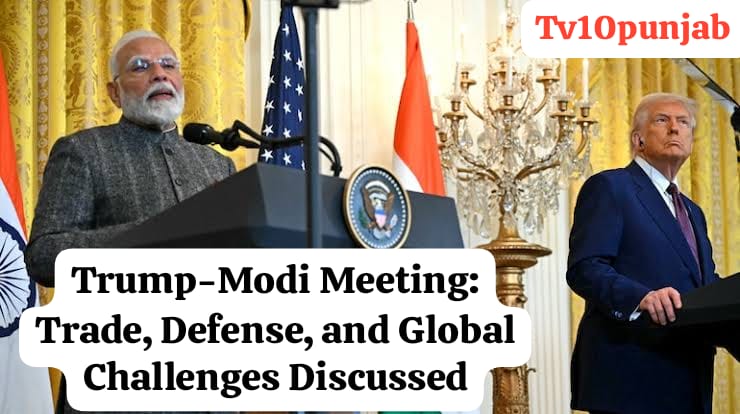National/ International/Business Desk
14 February
Ludhiana
Sandeep Dhand
U.S. President Donald Trump announced that after discussions with Indian Prime Minister Narendra Modi, India would purchase more oil, gas, and military hardware—including F-35 fighter jets—from the U.S. to reduce the trade deficit. However, Trump emphasized that Washington would not exempt New Delhi from reciprocal tariffs.

On Thursday (Friday as per Indian time), Trump warmly welcomed Modi at the White House’s Oval Office, shaking hands and calling him a “great friend” and a “tremendous leader.” Following their talks, both leaders addressed the media, where Trump highlighted ongoing discussions for a major trade agreement. He criticized India’s import duties on certain American products, calling them “unfair and tough.”
“Whatever tariffs India imposes, we will respond with equal tariffs,” Trump stated, adding that the U.S. seeks a reciprocal trade relationship with India. The meeting took place just hours after Washington announced a new tariff policy affecting all trading partners.
Trump further noted that he and Modi had agreed on a deal that could make the U.S. India’s top supplier of oil and gas. He suggested this move was part of efforts to reduce the nearly $45 billion trade deficit between the two nations.
Counterterrorism and Extradition of 26/11 Accused
Trump also declared that India and the U.S. would work together to counter radical Islamic extremism worldwide. He confirmed the approval of the extradition of Tahawwur Rana, accused of involvement in the 26/11 Mumbai attacks.
“Tahawwur Rana, one of the worst criminals, is being sent back to India to face justice,” Trump announced. He hinted at more such extraditions, stating that the U.S. had received multiple requests from India. Rana, currently held in Los Angeles, has links to David Coleman Headley, a key conspirator behind the Mumbai attacks.
Nuclear Energy and Defense Cooperation
Trump praised the positive momentum in U.S.-India civil nuclear cooperation, noting that India was making legal reforms to welcome American nuclear technology. Modi, in his address, emphasized that U.S.-India collaboration could shape a better world and announced plans for a long-term defense partnership over the next decade.
“I greatly respect how President Trump prioritizes national interests. Like him, I too put India’s national interests above everything else,” Modi stated.
China Border Dispute and Global Conflicts
When asked about the India-China border dispute, Trump described the standoff as “serious” and regretted not being able to mediate. “I see the tensions on the border… it’s terrible. I wish I could help,” he said, adding that he hoped India, China, Russia, and the U.S. could maintain good relations.
On the Russia-Ukraine war, Modi expressed support for diplomatic efforts led by Trump to find a peaceful resolution. “India has not been neutral in this war; we have always stood for peace,” he clarified.
Economic Corridor and Business Talks
Trump and Modi also discussed creating one of the largest trade routes in history, connecting India, the Middle East, and Europe. Before meeting Trump, Modi held separate discussions with U.S. National Security Advisor Mike Waltz, Intelligence Director Tulsi Gabbard, billionaire Elon Musk, and Republican leader Vivek Ramaswamy.